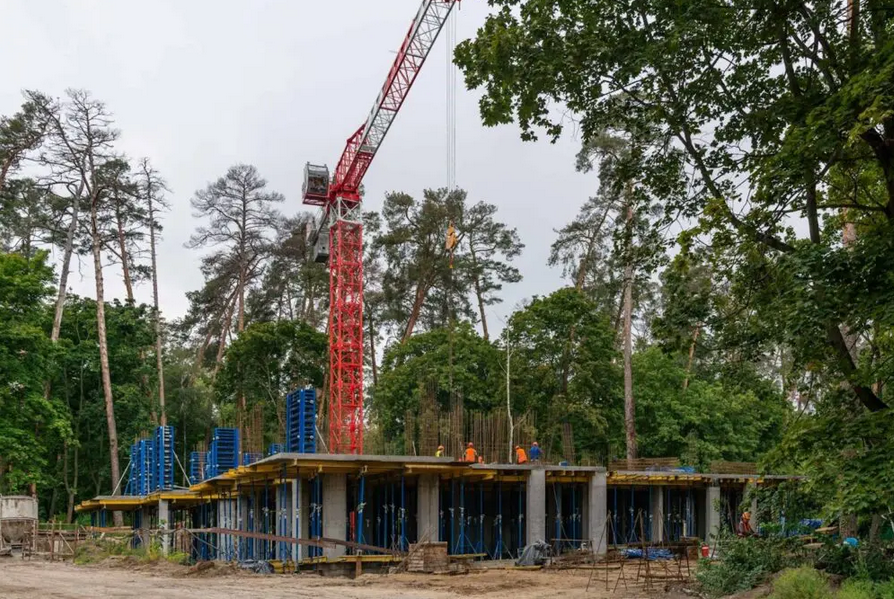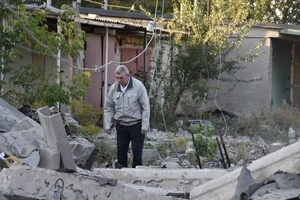To build up everything? Lobbyists are breaking into «the window of opportunity»

The Verkhovna Rada has registered draft law №11184, which aims to simplify the lives of developers, under the guise of good intentions about displaced persons
A draft law (11184) has been registered in the parliament, which aims to make life easier for developers. Such legislative initiatives are traditionally presented under the guise of rebuilding and caring for tens of thousands of internally displaced persons.
What do the authors propose and why should this idea alarm residents of Ukrainian villages and cities? We explain this in detail in our article for Hlavkom.
One of the current safeguards against uncontrolled development is the designated purpose of land. If a developer wants to build a skyscraper instead of a green zone, the local council must vote to change the designated purpose of the land plot. To prevent such obstacles for developers, Stepan Cherniavskyi, a Servant of the People, submitted a draft law that provides for the possibility of changing the designated purpose of a land plot if the urban planning documentation is not included in the land cadastre.
This legislative initiative was supported by twenty MPs, including Oleksandr Horobets and Serhiy Bunin from the Servant of the People party.
The Association of Ukrainian Cities has already emphasized that such a rule would narrow the rights of municipalities and contain corruption risks.
In addition, this project establishes new opportunities for agricultural barons: if the law is passed, they will be able to gain access to particularly valuable land. This initiative also has an explanation: the key author of the changes is MP Cherniavskyi, who comes from an agribusiness background and is the deputy chairman of the Committee on Agrarian Policy.
This is not the first time that the group of MPs led by Cherniavsky has done this. Almost the same group of authors registered another initiative that provides amnesty for land grabbers and carte blanche for officials to alienate forests, coastal and border strips, nature reserves, landscape parks, natural monuments, botanical gardens, etc. (11185). The Golka civic initiative wrote that currently, communities and the state can return illegally privatized forests, nature reserve lands, and coastal lands through the courts for any length of time, while the aforementioned group of MPs proposes to limit the period to five years.
The numbers of both the «amnesty» and land «liberalization» bills (11185 and 11184, respectively) indicate that they were submitted one after the other and on the same day. The timing of the submission also coincides with a massive information campaign in support of the controversial businessman Ihor Mazepa, who is accused of land fraud by the State Bureau of Investigation.
The committee that is supposed to consider such legislative initiatives is headed by Olena Shulyak, the head of the Servant of the People party. This politician is known for lobbying for the scandalous urban planning «reform» (Draft Law 5655).
The interests of developers are also lobbied through the Legal Policy Committee, headed by Denys Maslov (Servant of the People). There are legislative initiatives under consideration that stipulate that a deputy or an official may be guilty of schemes to alienate state or community property, but not the one who eventually received the property (11134 and 11135).
The Holka civil initiative continues to investigate projects that could deform the legislative field in the interests of large players in the construction business and agricultural holdings.
What is meant?
Now all land must be included in different functional zones. These zones determine the category of land and its intended use. There are residential and public development lands, green, landscape and recreational, historical and cultural, industrial and warehouse development, and transport and utility lands.
According to the law, functional zones must be part of community development plans and must be included in the State Land Cadastre.
According to Dmytro Makarenko, acting head of the State Service of Ukraine for Geodesy, Cartography, and Cadastre, it is very important not to equate the concepts of «land plot» and «functional zone». After all, several types of functional zones can be defined and included on one land plot, including a road, public buildings, and, for example, a green zone: «By the way, the existence of functional zones greatly simplifies the process of changing the designated purpose of a land plot, as it is immediately clear what use it is planned to make following urban planning documentation. There may be hundreds of thousands of functional zones across the country. But as of now, the State Land Cadastre has processed only 41 applications for such functional zones. One application for a functional zone may include several types of such zones. So, if we talk about the number of types of functional zones, there are 141 of them in the cadastre. The total area is 3710 hectares, which is significantly less than 1% of the entire territory of Ukraine. This is happening at a slow pace because the cost of such work is quite high».
It is here that the most interesting part begins. The authors of the legislative initiative «On favorable conditions for business development» (11184) propose that in cases where such functional zones are not included in the cadastre, it is possible to change the purpose of land plots without taking such zones into account. This includes almost all land plots in the country.
Now, according to the law, to build industrial facilities, it is possible to change the designated purpose of land (except for environmental and historical zones) only outside settlements. If the draft law is passed, the change of designated purpose will also be possible for land within settlements, where developers will be able to build residential and non-residential buildings.
Developers will be able to negotiate directly with the chief architect to change the designated purpose to the one they need. Such an approach will facilitate abuses in the use of land and pose a significant threat of increasing corruption risks.
Oleksandr Slobozhan, Executive Director of the Association of Ukrainian Cities, notes that the proposed changes in this project may lead to chaotic construction: «The owners of the plots are offered to determine the intended use at their discretion, without the community's position, which will lead to massive chaotic construction. It also creates corruption risks – without urban planning documentation and a decision of the local council, the right to decide on construction is granted to the architect alone. Accordingly, there is no public discussion or environmental review».
Big reconstruction as a cover for the lobbists
Currently, to build in a settlement, a developer must obtain urban planning conditions and restrictions from the local council.
This document should specify how many floors a building should have, what the building density should be, how the territory should be landscaped, etc. All these conditions must be consistent with the master plan of the settlement.
A developer may fail to obtain urban planning conditions and restrictions in three cases:
- submission of an incomplete list of documents
- revealing inaccurate information in the documents certifying the right of ownership or use of the land plot, or in the documents certifying the right of ownership of the real estate located on the land plot
- inconsistency of development intentions with the requirements of urban planning documentation at the local level.
The authors of the draft law «On Favorable Conditions for Business Development» propose to leave only one ground for refusal – the submission of an incomplete package of documents.
That is, no matter what documents are submitted by the developer and what construction project he has planned if he has submitted all the documents according to the list, he simply has no right to refuse to issue urban planning conditions and restrictions.
The deputies also propose to remove the possibility of making any changes to urban planning conditions and restrictions, leaving only the option of canceling them under a court decision. And given the possible changes to the law, it will be almost impossible to do so.
All of this negates the need to develop urban planning documentation, which can result in chaotic development without following any rules. At the same time, the role of citizens is leveled.
Janos Brener, a Berlin city planner and expert at the German Society for International Cooperation (GIZ), also emphasizes the importance of the role of the community: «In the context of Law 5655 (the urban planning «reform» authored by Shulyak and criticized by the European Parliament and the European Commission – Hlavkom), it was suggested that it should «destroy» the so-called monopoly of «local authorities in decision-making» . This reveals a complete misunderstanding of the role and importance of local governments. When it comes to the implementation of urban planning documents, there is a natural monopoly of the community guaranteed by the Constitution. This is not a technical task (which can be privatized under certain conditions), but a political issue that reflects the true political will of the community».
In fact, after the urban planning «reform» 5655 was not signed by President Volodymyr Zelenskyy, one after another bill appeared in the parliament, proposing, at first glance, minor changes to the legislation in the interests of developers. But in total, this looks like an organized attempt to change the rules in the interests of large construction businesses. In other words, they are taking small steps to accomplish what they failed to do at the first attempt.
Activists in Kyiv who are protecting the territory of the Prolisok tourist complex from development already understand the danger that the project of the Servant of the People MPs could pose to recreational areas.
Maryna Antoshchuk, аn activist based in Kyiv said: «This can bury all the efforts of the community. Construction is currently underway on recreational land under the guise of reconstructing a hotel complex. And the discrepancy between the intentions of the development and the intended purpose is the main argument of the defenders».
Who else could benefit?
The draft law «On Creating Favorable Conditions for Business» provides benefits not only for developers but also for agribusiness. However, the environment has been left out of the equation.
Since almost 100% of Ukraine’s territory is not covered by functional zones according to the State Land Cadastre, the special classifier will not work as a safeguard against uncontrolled and unecological land use.
Petro Tiestov, an analyst at the Ukrainian Nature Conservation Group, says that if the project is supported, we will face further destruction of steppes or the uprooting of self-seeding forests: «The essence of the classifier is simple: if a plot is included in the zone of «territories for haying and grazing» , then it cannot have the designated «purpose of agricultural commodity production». That is, it will not be possible to plow it up, but you can mow hay, graze cattle, and create protected areas».
Yulia Ovchynnikova (Servant of the People), a member of the Verkhovna Rada Environmental Committee, also confirms that if this bill is passed, the area of devastated pastures and hayfields will increase: «This is extremely harmful to the climate and biodiversity. I believe that, on the contrary, we need to speed up the development of documentation that will define the boundaries of functional zones and thus preserve steppes and meadows».
The simultaneous appearance of several draft laws in parliament with rules that favor big business may indicate the activities of a cartel that interacts with lawmakers.
Cartel collusion occurs when large players from the same sector unite and do everything to create favorable conditions for themselves. Cartel agreements are prohibited by European law. Namely, the Treaty on the Functioning of the European Union. The Antimonopoly Committee of Ukraine has also long been talking about the harm caused by cartels and notes that they have a strong impact on the welfare of society.
This text is in Ukrainian


















Коментарі — 0